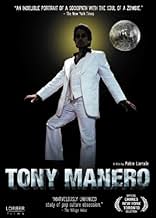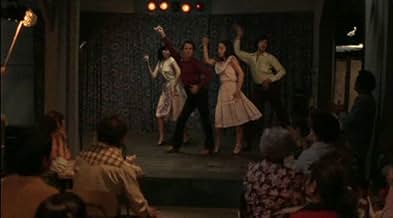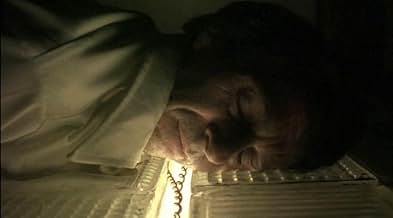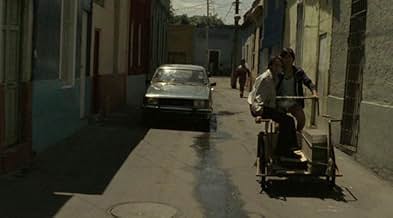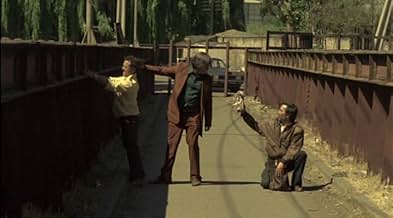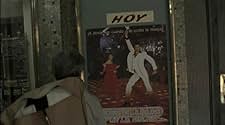CALIFICACIÓN DE IMDb
6.8/10
4.7 k
TU CALIFICACIÓN
Un hombre está obsesionado con el personaje de baile de John Travolta de Fiebre de sábado por la noche.Un hombre está obsesionado con el personaje de baile de John Travolta de Fiebre de sábado por la noche.Un hombre está obsesionado con el personaje de baile de John Travolta de Fiebre de sábado por la noche.
- Dirección
- Guionistas
- Elenco
- Premios
- 19 premios ganados y 16 nominaciones en total
- Dirección
- Guionistas
- Todo el elenco y el equipo
- Producción, taquilla y más en IMDbPro
Opiniones destacadas
THis film sneaks up on you - there is something unsettling and powerful about it. The lead performance is raw, real and sad. This guy is a low street thief who has a circle of whores and other lowlifes around him. It doesn't matter if you know a bit about the horrible regime of General Pinochet who was in power when the film is set - 1978 but the movie is a metaphor for this brutal dictator's control of the country - insane behavior creating insane results. The lead guy is obsessed with Travolta's film Saturday Night Fever - he watches it in a movie theatre endlessly - memorizing the dialogue and all of Travolta's moves and dance steps. A Chile TV Variety show has celebrity look-a-like contests and he was to enter and win the Tony Manero contest - white suit and all. This movie feels like a documentary - and there are moments of calm followed by shocking displays of violence. I can see that this film might not be for everyone but I found it to be incredibly powerful. I disagree with the summary on this page though that describes the guy as a "serial killer" - he is not a serial killer - he just makes sure to get anyone out the way who stands between him and his obsession.
For a hit movie, 'Saturday Night Fever' is a surprisingly bleak and serious film; but not quite as dark as 'Tony Manero', a Chilean movie about a criminal whose life dream is to emulate the character played by John Travolta in the earlier film. Both the anti-hero, and the society he lives in (it's the Chile of Augusto Pinochet) are pretty rotten, and the film cuts neither any slack. Indeed, behind the black comedy, this is a portrait of a civilisation on the brink of collapse through a loss of respect for basic human dignity: the fake Manero desperately seeks dignity for himself in his act, but shows no respect for anyone else's. It's compelling, convincing, and yet, as a story, ever so slightly pointless: 'Satruday Night Fever' had its own redemption narrative, and while one can mock this as Hollywood softening, without any such story a film can seem slightly devoid of direction: it's hard to even imagine what a happy ending would have been for 'Tony Manero', so hopeless is the initial premise. It's still a good film; and fundamentally a political one, even though the politics is all implicit.
Edging to the annual awards season, this year a sure thing is that Chilean director Pablo Larrín will on everybody's radar with his one-two punch NERUDA (Chile's entry for the Best Foreign Language Film) and the formidable JACKIE, a biopic about Jacqueline Kennedy, may win its star Natalie Portman a second Oscar statue as a major player.
So here comes a warm-up to get acquainted with Larrín's previous work, TONY MANERO is his second feature, a sombre take on Chile's darkest time under the Pinochet regime peppered by a less sombre through-line: the 52-year-old protagonist Raúl Peralta's (Castro, Larrín's regular, an Al Pacino doppelgänger both in appearance and affective intensity, also the co-writer of the script) obdurate participation of a TV program "One O'Clock Festival", where a Tony Manero (the lead character in John Badham's Saturday NIGHT FEVER 1977, played by John Travolta) impersonation competition is scheduled in Santiago, 1978.
Examined closely by a hand-held Super 16mm, which intermittently toys with a blurry focus to accentuate the proximity of a sordid milieu, Raúl gives us the first impression of a pallid, taciturn, hangdog loner in the opening scenes where he mistakes the registration date as the actual contest, which will be held one week later. But that facet loses its disguise quickly, when he schematically assaults an old woman who has just been mugged on the street, at her own home, to take away her small boxy color TV set. He is not so much a petty criminal as a ruthless homicide, which ingeniously puts audience at the edge of the seat with a dreadful perturbation whenever he prowls or idles in the dilapidated environs, as violence could be erupted any moment if he sees the opportunity for a monetary gain, whoever the prey is.
Raúl lives with a coterie of amateur dancers in the scruffy house of Wilma (Poblete), where they also occasionally perform to entertain customers. His troupe includes Cony (Noguera), his friend- with-benefit, her adolescent daughter Pauli (Lattus) and Pauli's boyfriend Goyo (Morales). Together they help Raúl to rehearse the John Travola routine, but there is seething tension underneath, Raúl becomes impotent during an overtly explicit rumpy-pumpy, and is mocked by Cony that the only thing can revitalize him is the urge to win the competition, which sours their relationship, Goyo is involved with some surreptitious anti-Pinochet movement, which will put everyone under the interrogation of Pinochet's plainclothes secret police, although Raúl manages to skulk out since it is his big day.
Larrín's tack doesn't shy away from being obstinately provocative, up to an instance of sickeningly scatological malevolence, which seems like an unwarranted feeler to validate its sky's-the-limit artsy taste. But on the other hand, Larrín and his co-writers perspicuously cast a phenomenon of American culture invasion as an escapism for the amoral and the hard-up living under the terror of an autocracy, which indisputably hits the mark of liberating its restrained but astringent political manifesto.
Alfredo Castro is absolutely electrifying to watch from A to Z in the central role, holding Raúl's interior thoughts at bay, but excellently transforms himself onto the screen as a ravishingly volatile monster, with no fear, no conscience, no hold-up can stop his destructive/self-destructive wantonness (as the inauspicious ending dauntingly beckons), who should be answer for this type of societal mutator? The culprit is clear as day in this slam-bang critique of a bygone era weighing heavily on Larrín's fatherland.
So here comes a warm-up to get acquainted with Larrín's previous work, TONY MANERO is his second feature, a sombre take on Chile's darkest time under the Pinochet regime peppered by a less sombre through-line: the 52-year-old protagonist Raúl Peralta's (Castro, Larrín's regular, an Al Pacino doppelgänger both in appearance and affective intensity, also the co-writer of the script) obdurate participation of a TV program "One O'Clock Festival", where a Tony Manero (the lead character in John Badham's Saturday NIGHT FEVER 1977, played by John Travolta) impersonation competition is scheduled in Santiago, 1978.
Examined closely by a hand-held Super 16mm, which intermittently toys with a blurry focus to accentuate the proximity of a sordid milieu, Raúl gives us the first impression of a pallid, taciturn, hangdog loner in the opening scenes where he mistakes the registration date as the actual contest, which will be held one week later. But that facet loses its disguise quickly, when he schematically assaults an old woman who has just been mugged on the street, at her own home, to take away her small boxy color TV set. He is not so much a petty criminal as a ruthless homicide, which ingeniously puts audience at the edge of the seat with a dreadful perturbation whenever he prowls or idles in the dilapidated environs, as violence could be erupted any moment if he sees the opportunity for a monetary gain, whoever the prey is.
Raúl lives with a coterie of amateur dancers in the scruffy house of Wilma (Poblete), where they also occasionally perform to entertain customers. His troupe includes Cony (Noguera), his friend- with-benefit, her adolescent daughter Pauli (Lattus) and Pauli's boyfriend Goyo (Morales). Together they help Raúl to rehearse the John Travola routine, but there is seething tension underneath, Raúl becomes impotent during an overtly explicit rumpy-pumpy, and is mocked by Cony that the only thing can revitalize him is the urge to win the competition, which sours their relationship, Goyo is involved with some surreptitious anti-Pinochet movement, which will put everyone under the interrogation of Pinochet's plainclothes secret police, although Raúl manages to skulk out since it is his big day.
Larrín's tack doesn't shy away from being obstinately provocative, up to an instance of sickeningly scatological malevolence, which seems like an unwarranted feeler to validate its sky's-the-limit artsy taste. But on the other hand, Larrín and his co-writers perspicuously cast a phenomenon of American culture invasion as an escapism for the amoral and the hard-up living under the terror of an autocracy, which indisputably hits the mark of liberating its restrained but astringent political manifesto.
Alfredo Castro is absolutely electrifying to watch from A to Z in the central role, holding Raúl's interior thoughts at bay, but excellently transforms himself onto the screen as a ravishingly volatile monster, with no fear, no conscience, no hold-up can stop his destructive/self-destructive wantonness (as the inauspicious ending dauntingly beckons), who should be answer for this type of societal mutator? The culprit is clear as day in this slam-bang critique of a bygone era weighing heavily on Larrín's fatherland.
Ive been meaning to review this film for years as it has stayed with me from when I first sewed it many years ago.
I think this is a terrifying masterpiece, its underrated, under discussed, and shows the true horror of serial killers instead of the glamorous side of in such films such as Silence of the Lambs or the Tv series Mindhunter.
The connection of the Saturday Night Fever character to a serial is sheer perfection, its bizarre yet truly haunting.
I think this is a terrifying masterpiece, its underrated, under discussed, and shows the true horror of serial killers instead of the glamorous side of in such films such as Silence of the Lambs or the Tv series Mindhunter.
The connection of the Saturday Night Fever character to a serial is sheer perfection, its bizarre yet truly haunting.
In the midst of the social context of the Pinochet dictatorship, Raúl Peralta, a man in his 50s, is obsessed with the idea of impersonating Tony Manero, John Travolta's character in the movie "Saturday Night Fever". Raúl leads a small group of dancers, who regularly perform at a bar on the outskirts. Every Saturday night, he unleashes his passion for movie songs by imitating his idol. His dream of being recognized as a successful showbiz star is about to come true when the national TV station announces a Tony Manero impersonator contest. His anxiety to reproduce the idol leads him to commit a series of crimes and thefts.
It is an extremely ambiguous film, at the same time that we feel sorry for the protagonist in the first ten minutes we feel the incredible that pulsates and disgust for its violent and obsessive data, bordering on the sick... A very interesting film with a differentiated approach, obsession for a idol, the dream of pursuing a profession and aggression taking on realistic contours...
It is an extremely ambiguous film, at the same time that we feel sorry for the protagonist in the first ten minutes we feel the incredible that pulsates and disgust for its violent and obsessive data, bordering on the sick... A very interesting film with a differentiated approach, obsession for a idol, the dream of pursuing a profession and aggression taking on realistic contours...
¿Sabías que…?
- TriviaSome clips and tunes from both Fiebre de sábado por la noche (1977) and Vaselina (1978) appear in this film, the most prominent song heard is The Bee Gees' "You Should Be Dancing" from Saturday Night Fever. The final credits acknowledge Paramount Pictures for use of both films in this picture.
- ErroresThe "Members Only" jacket worn by Raul wasn't introduced until 1981, and the film takes place in 1978.
- Citas
Title Card: [first lines]
Don Enrique: [subtitled version] And now we present our look-alike contest: 'The One O'clock Festival'
Security Guard: Wait here, please.
- ConexionesFeatured in Sin maquillaje: Alfredo Castro (2011)
Selecciones populares
Inicia sesión para calificar y agrega a la lista de videos para obtener recomendaciones personalizadas
- How long is Tony Manero?Con tecnología de Alexa
Detalles
Taquilla
- Total en EE. UU. y Canadá
- USD 20,677
- Fin de semana de estreno en EE. UU. y Canadá
- USD 3,305
- 5 jul 2009
- Total a nivel mundial
- USD 687,406
- Tiempo de ejecución
- 1h 37min(97 min)
- Color
- Mezcla de sonido
- Relación de aspecto
- 1.85 : 1
Contribuir a esta página
Sugiere una edición o agrega el contenido que falta


